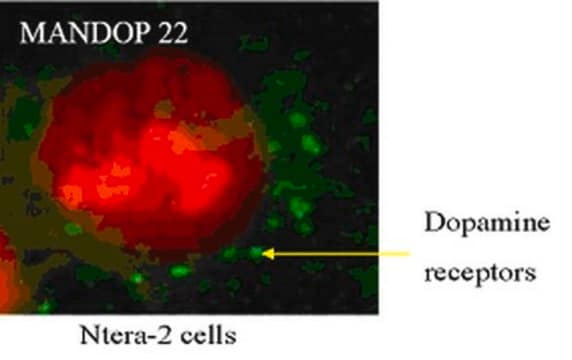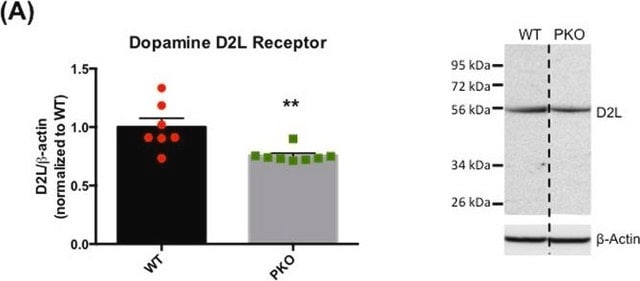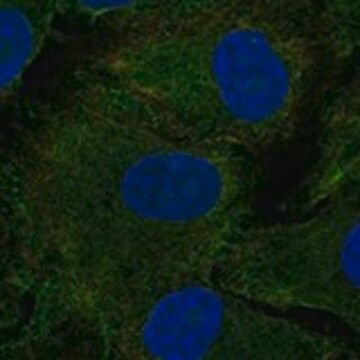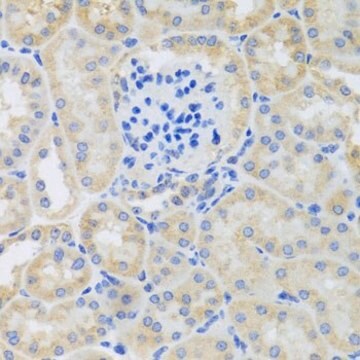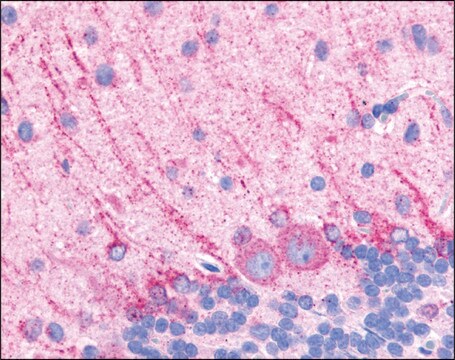AB1558
Anti-Dopamine D2 Receptor Antibody
serum, Chemicon®
Synonym(s):
Anti-D2DR, Anti-D2R
About This Item
Recommended Products
biological source
rabbit
Quality Level
antibody form
serum
antibody product type
primary antibodies
clone
polyclonal
species reactivity
rat
manufacturer/tradename
Chemicon®
technique(s)
ELISA: suitable
immunocytochemistry: suitable
immunohistochemistry: suitable
western blot: suitable
NCBI accession no.
UniProt accession no.
shipped in
dry ice
target post-translational modification
unmodified
Gene Information
rat ... Drd2(24318)
Specificity
Immunogen
The immunogen shows 100% homology with mouse, 90% with human and bovine and 72% with canine D2R receptors. An antibody made to the same sequence has shown reactivity with human, lobster, squid and crawfish.
Application
Immunohistochemistry: 4% PFA fixed, frozen sections, 1:200, 24 hour incubation at room temperature, DAB detection. {Tillerson, JL et al. (2006) Behavioural Brain Res. 172:97-105.
Immunocytochemistry: 4% PFA fixed cells 10-15′, permeabilized with 0.2-0.3% triton X-100, 1:100, o/N 4C for fluorescence {Sun, W et al (2005) Stem Cells 23(7):931-945, http://stemcells.alphamedpress.org/cgi/content/full/23/7/931}.
Western blot: 1:1,000-1:5,000 (Chemiluminescence technique) Higher concentration of antibody may be necessary when using low concentration samples or when using milk in antibody diluents. It may be necessary to load 100-200 μg of purified striatal or other tissue membranes to visualize the DR2 bands. The antibody has been shown to recognize both native and denatured DR2 bands.
ELISA: 1:10,000-1:50,000 [1 μg/mL D2R peptide (Cat. Number AG284)/well]
Optimal working dilutions must be determined by end user.
Neuroscience
Neurotransmitters & Receptors
Target description
Physical form
Storage and Stability
Analysis Note
Brain
Other Notes
Legal Information
Disclaimer
Not finding the right product?
Try our Product Selector Tool.
Storage Class Code
10 - Combustible liquids
WGK
WGK 1
Certificates of Analysis (COA)
Search for Certificates of Analysis (COA) by entering the products Lot/Batch Number. Lot and Batch Numbers can be found on a product’s label following the words ‘Lot’ or ‘Batch’.
Already Own This Product?
Find documentation for the products that you have recently purchased in the Document Library.
Our team of scientists has experience in all areas of research including Life Science, Material Science, Chemical Synthesis, Chromatography, Analytical and many others.
Contact Technical Service
